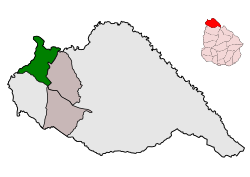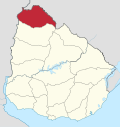Municipality of Bella Unión
 From Wikipedia the free encyclopedia
From Wikipedia the free encyclopedia
Municipality of Bella Unión Municipio de Bella Unión | |
|---|---|
| Municipality of Bella Unión | |
 Location of the municipality of Bella Unión within the department of Artigas and Uruguay. | |
| Coordinates: 30°18′S 57°36′W / 30.3°S 57.6°W | |
| Country | |
| Department | Artigas |
| Founded (as Local Board) | 14 June 1994 |
| Conversion to Municipality | 13 September 2009 |
| Seat | Bella Unión |
| Government | |
| • Mayor | William Cresseri (PN) [1][2] |
| Area | |
| • Total | 547 km2 (211 sq mi) |
| Population (2011)[3] | |
| • Total | 18,406 |
| • Density | 34/km2 (87/sq mi) |
| Time zone | UTC-3 |
| Constituencies | ICD, ICE and ICF |
The municipality of Bella Unión is one of the municipalities of Artigas Department, Uruguay, established on 13 September 2009. Its seat is the city of Bella Unión. It replaced the Autonomous and Elective Local Board of Bella Union created in 1994.
History
[edit]The Local Board of Bella Unión was established as Autonomous and Elective on 14 June 1994, obtaining wider powers than existing standard Local Boards. Until before the Laws of Municipalities were passed in late 2009 and early 2010, it was one of the three existing second level administrative subdivisions with certain level of autonomy and able to held local elections of its authorities. It comprised the territory of the Seventh Judicial Section of Artigas Department.[4]
In September 2009 it was converted to Municipality, following the provisions of the Municipalities Laws 18567 and 18653 (that ordered the creation of municipalities in all settlements with a population of at least 2000 inhabitants), with the powers of the new system but also keeping the powers obtained from the former system. It includes the constituencies identified by the series ICD, ICE and ICF, and keeps the same territory assigned to the Autonomous and Elective Local Board of Bella Unión.[5][6][7]
Location
[edit]The municipality is located in the northeast corner of Artigas Department, west to the municipality of Tomás Gomensoro, and bordering Brazil's Rio Grande do Sul State to the north and Argentina's Corrientes Province to the west.
Settlements
[edit]The following settlements are part of this region:
- Bella Unión (seat)
- Cainsa
- Calnu
- Cuareim
- Mones Quintela
Authorities
[edit]The authority of the municipality is the Municipal Council, integrated by the Mayor (who presides it) and four Councilors. The following is the list of authorities since 2010.
| N° | Mayor | Party | Start | End | Notes |
|---|---|---|---|---|---|
| 1 | William Cresseri | Frente Amplio | 2010 | 2015 | Elected Mayor.[8] Councilors: Luis Carlos López (FA), Jesús Moraes (FA), María Moraes (FA), Aldorio Silveira (PN).[8] |
| 2 | Luis Carlos López | Frente Amplio | 2015 | 2020 | Elected Mayor.[9] Councilors: Washington Pereira (FA), Yamandú Oliveira (FA), William Cresseri (PN),[a] Ruben Prats (PN).[10] |
| 3 | William Cresseri | National Party | 2020 | Incumbent | Elected Mayor.[1][2][a] Councilors: Luis García (PN), Juan C. Brandon (PN), Yamandú Olivera (FA), Hugo Dávila (FA).[12] |
Notes
[edit]References
[edit]- ^ a b "Mapa de municipios: blancos ganan al menos 21 alcaldías más y FA sigue perdiendo pie" (in Spanish). El Observador. 28 September 2020. Retrieved 5 October 2020.
- ^ a b "Alcaldes y Alcaldesas asumieron en los 125 Municipios de Uruguay" (in Spanish). Office of Planning and Budget. 30 November 2020. Retrieved 10 December 2020.
- ^ "Bella Unión" (in Spanish). Uruguay Territory Observatory, Office of Planning and Budget. Retrieved 6 August 2021.
- ^ "Ley N° 16494. JUNTAS LOCALES" (in Spanish). IMPO. Retrieved 6 August 2021.
- ^ "Diario de Sesiones de la Asamblea General, Primer período ordinario de la XLVIIa legislatura, 4ª sesión". Parliament of Uruguay. 11 March 2010. Archived from the original on 4 March 2016. Retrieved 6 August 2021.
- ^ "Ley N° 18653. CREACION DE MUNICIPIOS EN LOS DEPARTAMENTOS QUE SE DETERMINAN" (in Spanish). IMPO. Retrieved 6 August 2021.
- ^ "Ley N° 18567. Determínase un nuevo régimen para la descentralización en materia departamental y local y participación ciudadana [original text]" (in Spanish). IMPO. Retrieved 6 August 2021.
- ^ a b Lizbona, Alexandra; Lorenzoni, Miguel; Nieto, Ernesto (2011). "Algo cambió en el Norte. Artigas: del predominio inquebrantable a la rotación permanente". In Cardarello, Antonio; Magri, Altaïr (eds.). Cambios, certezas e incertidumbres. Elecciones Departamentales y Municipales 2010 (PDF) (in Spanish). Montevideo: Politic Science Institute, School of Social Sciences, University of the Republic. pp. 181–199. ISBN 978-9974-8068-9-4. Archived from the original (PDF) on 10 December 2013.
- ^ "Quiénes son los 112 alcaldes del país" (in Spanish). Portal 180. 11 May 2015. Retrieved 16 June 2015.
- ^ a b Nieto, Ernesto; Pérez, Mauro; Ruíz Díaz, Matías (2017). "¿La alternancia lllegó para quedarse? Elecciones departamentales y municipales 2015 en Artigas". In Cardarello, Antonio; Freigedo, Martín (eds.). Los desafíos de un cambio. Elecciones Departamentales y Municipales 2015 (PDF) (in Spanish) (First ed.). Montevideo: School of Social Sciences, University of the Republic. pp. 222–241. ISBN 978-9974-0-1438-1. Archived from the original (PDF) on 6 August 2021 – via Colibri repository.
- ^ "Lacalle Pou en la asunción del alcalde de Bella Unión, "un compromiso con la ciudad y su futuro"" (in Spanish). Montevideo. UyPress. 26 November 2020. Retrieved 6 August 2021.
- ^ "Listado de Alcaldes y Concejales 2020-2025" (in Spanish). Electoral Court of Uruguay. Archived from the original on 3 August 2021. Retrieved 6 August 2021.
